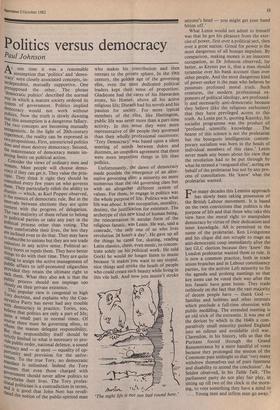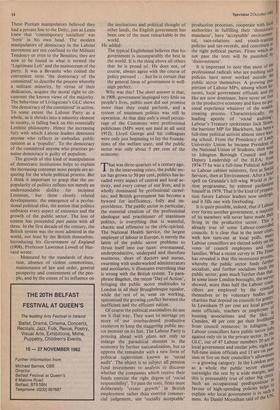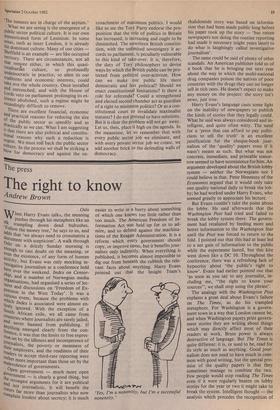Politics versus democracy
Paul Johnson
At one time it was a reasonable assumption that 'politics' and 'demo- cracy' were closely associated concepts, in- terdependent, mutually supportive. One presupposed the other. The phrase democratic politics' described the normal way in which a mature society ordered its system of government. Politics implied democracy would not work without politics. Now the truth is slowly dawning that this assumption is a dangerous fallacy. The two concepts are becoming mutually antagonistic. In the light of 20th-century experience, the reality can be expressed in two propositions. First, unrestricted politics does and must destroy democracy. Second, the maintenance of democracy means im- posing limits on political action. Consider the views of ordinary men and women. Most people will choose demo- cracy if they can get it. They value the prin- ciple. They think it right they should be consulted every few years on who governs them. They particularly relish the ability to dismiss — which, as Karl Popper observed, is the essence of democratic rule. But in the Intervals between elections they are quite content with the progress of delegation. The vast majority of them refuse to belong to Political parties or take any part in the Political process other than voting. The More comfortable their lives, the less they are Inclined even to do that. They may have to subscribe to unions but they are not trade Innonists in any active sense. Political ac- t,n!ltY bores or repels them. They have better things to do with their time. They are quite ‘Artiling to assign the active management of Public affairs to self-promoted oligarchies Provided they retain the ultimate right to sack them. What they also ask is that the P‘Ublie process should not impinge too l°selY on their private existence. This popular view is congenial to high t°tY doctrine, and explains why the Con- servative Party has never had any trouble believe democracy in practice. Tories, too, uelteve that politics are only a part of life; quite a small part in normal times. Of course there must be governing elites, to Bh°rn the masses delegate responsibility. strictly that responsibility itself should be vstr ,lettY limited to what is necessary to pro- vide Public order, national defence, a sound LUrre ncY and — at most — equality of op- rrtunitY and provision for the unfor- unate, the true Tory, no democratic arnandate is unlimited. Indeed the Tory ssulnes that even those charged with government should never allow politics to overwi,
helm their lives. The Tory profes- , °nal politician is a contradiction in terms,
ci and it is good that John Nott has revali- ated the notion of the public-spirited man
who makes his contribution and then retreats to the private sphere. In the 19th
century, the golden age of the governing
elite, even the most dedicated political leaders kept their sense of proportion: Gladstone had the cares of his Hawarden
estate, his Homer, above all his active religious life; Disraeli had his novels and his
passion for society. For more typical members of the elite, like Hartington, public life was never more than a part-time
activity. In this sense they were more representative of the people they governed than their wholly professional successors: `Tory Democracy' was based upon a silent meeting of minds between dukes and dustmen, an unspoken agreement that there were more important things in life than politics. Unfortunately, the dawn of democracy made possible the emergence of an alter- native governing elite: a minority no more numerous than the old governing class but with an altogether different system of values. For them, to engage in politics was the whole purpose of life. Politics was what life was about. It was occupation, morality, destiny, the justification for existence. The archetype of this new kind of human being, the reincarnation in secular form of the religious fanatic, was Lenin. He was, said a comrade, 'the only one of us who lives revolution 24 hours a day'. He gave up all the things he cared for, skating, reading Latin classics, chess, even music, to concen- trate solely on his political work. He told Gorki he would no longer listen to music because 'it makes You want to say stupid, nice things and stroke the heads of people who could create such beauty while living in this vile hell. And now you mustn't stroke
`The night life is not too bad round here.'
anyone's head — you might get your hand bitten off.'
What Lenin would not admit to himself was that he got his pleasure from the exer- cise of power, first over a political sect, then over a great nation. Greed for power is the most dangerous of all human impulses. By comparison, making money is an innocent occupation, as Dr Johnson observed; far better, as Keynes put it, that a man should tyrannise over his bank account than over other people. And the most dangerous kind of power-seeker is the man who believes he possesses profound moral truth. Such creatures, the modern professional ex- ponents of political ideology, are profound- ly and necessarily anti-democratic because they believe (like the religious enthusiast) that they have previleged access to this truth. As Lenin put it, quoting Kautsky, his socialist programme was the product of `profound scientific knowledge ... The bearer of this science is not the proletariat but the bourgeois intelligentsia: contem- porary socialism was born in the heads of individual members of this class.' Lenin never made any bones about his view that the revolution had to be put through by what he termed a 'vanguard elite', acting on behalf of the proletariat but not by any pro- cess of consultation. He 'knew' what the proletariat wanted.
For many decades this Leninist approach has slowly been taking possession of the British Labour movement. It is based on the twin convictions that politics is the purpose of life and that those who take this view have the moral right to manipulate democracy by virtue of their dedication and inner knowlegde. All is permitted in the name of the proletariat. Ken Livingstone and his clique did not scruple to stage an anti-democratic coup immediately after the last GLC election because they 'knew' the London proletariat wanted them to rule. It is now a common practice, both in trade union branches and in Labour constituency parties, for the activist Left minority to fix the agenda and prolong meetings so that key items can be voted their way after the less fanatic have gone home. They trade ruthlessly on the fact that the vast majority of decent people have — thank God families and hobbies and other interests which preclude a full-time obsession with public meddling. The extended meeting is an old trick of the extremist. It was one of the devices by which in the 1640s a com- paratively small minority pushed England into an odious and avoidable civil war. Clarendon, in his history, tells us that the Puritans forced through the Grand Remonstrance by a mere handful of votes because they prolonged the session of the Commons past midnight so that 'very many withdrew themselves out of pure faintness and disability to attend the conclusion'. As Selden observed, in his Table Talk, 'The parliament party do not play fair play, in sitting up till two of the clock in the morn- ing, to vote something they have a mind to ... Young men and infirm men go away.'
These Puritan manipulators believed they had a private line to the Deity, just as Lenin knew that 'contemporary socialism' was `born' in his own head. The modern manipulators of democracy in the Labour movement are not confined to the Militant Tendency or even to the Bennites; they are now to be found in what is termed the 'Legitimate Left' and the mainstream of the party. It was a Bevanite who coined the convenient term 'the democracy of the committed' to describe the process whereby a militant minority, by virtue of their dedication, acquire the moral right to cir- cumvent the known views of the majority. The behaviour of Livingstone's GLC shows 'the democracy of the committed' in action. To some extent the Labour Party as a whole, as it shrinks into a minority element in society, is falling back on this essentially Leninist philosophy. Hence the increasing fury with which Labour leaders denounce anyone who reflects or embodies public opinion as a 'populist'. To the democracy of the committed anyone who practises ge- nuine democracy is guilty of populism.
The growth of this kind of manipulation of democratic institutions helps to explain the increasing contempt most people are ac- quiring for the whole political process. But I think it important to grasp that the un- popularity of politics reflects not merely an understandable dislike for incipient Leninism, but three closely related developments: the emergence of a profes- sional political elite, the notion that politics embraces every aspect of existence and the growth of the public sector. The loss of esteem has proceeded pari passu with all three. In the first decade of the century, the British system was the most admired in the world, not least by the British themselves. Introducing his Government of England (1908), Professor Lawrence Lowell of Har- vard wrote:
Measured by the standards of dura- tion, absence of violent commotions, maintenance of law and order, general prosperity and contentment of the peo- ple, and by the extent of its influence on the institutions and political thought of other lands, the English government has been one of the most remarkable in the world.
He added: The typical Englishman believes that his government is incomparably the best in the world. It is the thing above all others that he is proud of. He does not, of course, always agree with the course of policy pursued ... but he is certain that the general form of government is well- nigh perfect.
Why was this? The short answer is that, in 1908, government impinged very little on people's lives, public men did not promise more than they could perform, and a system of minimum politics was still in operation. At that date only a small percen- tage of the Commons were professional politicians (MPs were not paid at all until 1912), Lloyd George and his colleagues were only just beginning to lay the founda- tions of the welfare state, and the public sector was only about 5 per cent of the economy.
That was three-quarters of a century ago. In the intervening years, the public sec- tor has grown to 50 per cent, politics has in- vaded every aspect of central and local ac- tivity, and every corner of our lives, and is wholly dominated by professional career- ists; and British government has become a byword for inefficiency, folly and im- providence. The public sector in particular, the essential creation of the professional ideologue and practitioner of maximum politics, is everything that is wasteful, chaotic and offensive to the civic-spirited. The National Health Service, the largest employer of labour in Europe, is merely the latest of the public sector problems to thrust itself into our faces: overmanned, underproductive, underpaid and therefore mutinous, short of doctors and nurses, swarming with underworked administrators and auxiliaries, it illustrates everything that is wrong with the British system. To para- phrase Bagehot, the recent 'Day of Action', bringing the public sector multitudes to London in all their Brueghelesque squalor, while the rest of us went on working, epitomised the growing conflict between the inefficient and the efficient nation.
Of course the political maximalists do not see it that way. They want to mortage yet more of our overburdened productive resources to keep the staggering public sec- tor monster on its feet. The Labour Party is pressing ahead with plans not only to enlarge the parasitical element in the economy by further nationalisation, but to oppress the remainder with a new form of political supervision known as 'social audit'. The object is to subject all pension fund investments to analysis to discover whether the companies which receive their funds exercise the right degree of 'social responsibility'. To pass the tests, firms must deliberately 'create ' growth' in British employment rather than exercise commer- cial judgement, use 'socially acceptable'
production processes, cooperate with local authorities in fulfilling their 'democratic mandates', have 'acceptable' environmen- tal, race-relations and youth-training policies and tax-records, and contribute to the right political parties. Firms which do not pass the tests will be punished by 'disinvestment'.
It is important to note that most of the professional radicals who are pushing such policies have never worked outside the public sector themselves. A growing pro- portion of Labour MPs, among whom lee" turers, local government officials and the like are now dominant, have never set foot in the productive economy and have no Per" sonal experience whatever of the wealth' creating process. Characteristically, the leading apostle of 'social auditing Labour's Treasury spokesman Jack Straw, the barrister MP for Blackburn, has been a full-time political activist almost since lay" ing school. From the Presidency of Leeds University Union he became President of the National Union of Students, then vven`, to Islington Borough Council and the Deputy Leadership of the [LEA; from 1974-77 he was a full-time Political AdvlSe',. to Labour cabinet ministers, first at Soc!al Services, then at Environment. After a brief spell on Granada's left-wing World in Ac- tion programme, he entered parliament himself in 1979. That is the kind of prepare. tion future Labour leaders now undergo, and it fills one with foreboding. It is quite possible, indeed, that if Lahn.nt, ever forms another government, a majont.) of its members will never have made then living in the productive sector. This Is, already true of some Labour-controlled councils. It is clear that in the inner cities' with low turn-out at local polls, mall'„ Labour councillors are elected solely on the votes of council employees and their families. What a recent survey in The Titnes has revealed is that this incestuous process, whereby the public sector feeds further_ socialism, and further socialism feeds the public sector, goes much 'further than that. In some inner London boroughs, the survey showed, more than half the Labour Conn• cillors are employed by the councils themselves or by voluntary bodies and charities that depend on councils for grants: In Lewisham 55 per cent are local governf ment officials, teachers or employees °,.0 housing associations and the like; ' , Camden, 48 per cent get their livelihol from council resources; in Islington, '2,...s Labour councillors have public sector .1°I),, against only six in the private sector. In the GLC, out of 47 Labour members 20 are in local government and similar jobs, eight are full-time union officials and 13 are on Pell, sion or live on their councillor's allowance” — a growing category. In the London area as a whole the public sector elegiac; outweighs the rest by a wide margin,. d.lis this is presumably true of other big cttle.,; Such an occupational predisposition 1::) favour of high-spending policies helps l'„ explain why local government is in such mess. As Daniel Moynihan said of the UN'
`The inmates are in charge of the asylum.'
What we are seeing is the emergence of a Public sector political culture. It is our own domesticated form of Leninism. In some areas, such as inner London, it is already the dominant culture. Many of our cities Sheffield is an example — are like occupied territory. There are circumstances, not all that remote either, in which this quasi- totalitarian culture, so profoundly undemocratic in practice, so alien to our traditions and economic interests, could take ove the whole country. Once installed and entrenched, and with the House of Lords veto on parliament prolonging its ex- istence abolished, such a regime might be exceedingly difficult to remove. There are excellent financial, economic and practical reasons for reducing the size of the public sector as speedily and as drastically as we can. What I am suggesting is that there are also political and constitu- tional reasons why such a reduction is urgent. We must roll back the public sector Culture. In the process we shall be striking a blow for democracy and against the en-
croachment of maximum politics. I would like to see the Tory Party endorse the pro- position that the role of politics in Britain has increased, is increasing and ought to be diminished. The unwritten British constitu- tion, with the unlimited sovereignty it ac- cords to parliament, is peculiarly vulnerable to this kind of take-over. It is, therefore, the duty of Tory philosophers to devise ways by which the British public can be pro- tected from political over-activism. How can we make our public life more democratic and less political? Should we enact constitutional limitations? Is there a role for referenda? Could a strengthened and elected second chamber act as guardian of a right to minimum politics? Or as a con- stitutional court to invalidate maximalist statutes? I do not pretend to have solutions. But it is clear the problem will not go away. Let us, then, place it high on the agenda. In the meantime, let us remember that with every public sector job we eliminate, and with every private sector job we create, we add another brick to the defending walls of democracy.








































 Previous page
Previous page